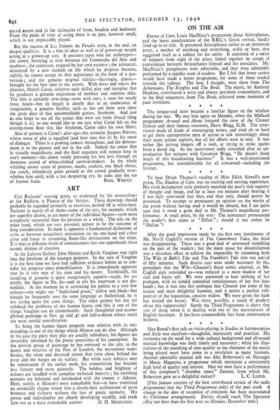ON THE AIR
Enemy of Cant, Louis MacNiece's programme about Aristophanes, and the latest manifestation of the B.B.C.'s Greek revival, hardly lived up to its title. It presented Aristophanes rather as an inveterate jester, a mocker of anything and everything, noble or base, that suggested itself as a subject for his satire. It consisted of a series of snippets from eight of the plays, linked together by scraps of conversation between Aristophanes himself and his associates. Mr. IviacNiece's paraphrases were admirable, and they were admirably performed by a capable team of readers. But I felt that fewer scenes would have made a better programme, for some of them tended towards the tedious. The best, I thought, were those from The Acharnians, The Knights and The Birds. The music, by Anthony Hopkins, contributed a witty and always pertinent commentary, and in the final sequences, from The Birds, achieved some moments of pure loveliness. * * The tongue-tied hero became a familiar figure on the wireless during the war. We met him again on Monday, when the Midland programme Around and About featured the crew of the Cromer lifeboat and their famous coxswain, Harry Blogg, G.M. The inter- viewer made all kinds of encouraging noises, and tried oh so hard to get these unresponsive men of action to talk interestingly about their many gallant exploits, but all his efforts were in vain. It was rather like prising limpets off a rock, or trying to strike sparks from a damp log. As the interviewer sadly remarked after an un- productive five minutes with Coxswain Blogg, "He doesn't think much of this broadcasting business." It was a well-intentioned programme, but uncomfortable for all concerned—including the listener.
• * * To hear Dylan Thomas's reading of Miss Edith Sitwell's new poem, The Shadow of Cain, was an exciting and moving experience. His vivid declamatory style perfectly matched the poet's rich tapestry of thought and image, and for at least ten minutes after hearing it I was fully convinced that thus, and thus only, should poetry be presented. To attempt to pronounce an opinion on the merits of the poem without having read it would be absurd, but I am quite sure that it owed a great deal to Mr. Thomas's magnificent per- formance. A small point, by the way : The announcer pronounced the reader's first name as " Dillan" ; should it not rather be " Dullan "?
• * * * After the good impression made by the first two instalments of Mr. Nevill Coghill's version of The Canterbury Tales, the third was disappointing. There was a good deal of unwonted stumbling on the part of the readers ; but the main cause for dissatisfaction was a mistaken effort to achieve the impossible by cramming both The Wife of Bath's Tale and The Franklin's Tale into one period of fifty minutes. Such drastic cuts were made necessary by thin procedure that the Wife—Chaucer's finest comic creation, as Mr. Coghill duly reminded us—was reduced to a mere shadow of her rich and fruity self. We were permitted to hear nothing of her prologue, with its candid connubial reminiscences of her five hus- bands ; but it was into this prologue that Chaucer put some of his raciest and most delightful humour, and it paints a perfect self- portrait of the loquacious, amative widow. We were given the husk but denied the kernel. Was there, possibly, a touch of prudery about this suppression? Surely the Third Programme is above that sort of thing when it is dealing with one of the masterpieces of. English literature. It has been commendably free from timorousness hitherto.
• * * * Max Rostal's first talk on violin-playing in Studies in Interpretation and Style was excellent—thoughtful, musicianly and practical. His insistence on the need for a wide cultural background and all-round musical knowledge was both timely and necessary ; while his illus- trations of the matching of tone-quality to the character of the music being played must have come as a revelation to many listeners. Another admirable musical talk was Alec Robertson's on Mascagni in Music Magazine, a programme which maintains a consistently high level of quality and interest. May we soon have a performance of this composer's " chamber opera " Zanetto, from which Mr.
Robertson gave us a delightful extract? L. C. LLOYD. [This feature consists of the best contributed review of the radio programmes (not the Third Programme only) of the past week. A change in the date of reception of criticisms has been necessitated by Christmas arrangements. Entries should reach The Spectator office not later than the first Post on Monday, December 15th.]


































 Previous page
Previous page